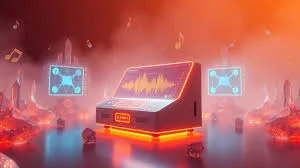Introduction: The Rise of AI in Beat Making
In 2025, AI beat making is no longer just a buzzword—it’s a full-fledged movement shaping the future of music production. The integration of artificial intelligence into digital audio workstations (DAWs), beat making software, and plugins is helping producers create, experiment, and innovate like never before. With machine learning algorithms analyzing musical patterns and generating unique rhythms, the beat-making process has evolved into a powerful blend of creativity and technology.
From beginners crafting their first loop to professionals scoring commercial hits, AI-powered tools are now a staple in the studio. But what exactly does this transformation mean for the average music producer? Let’s explore how AI is revolutionizing beat making in 2025 and what this means for the future of sound.
1. Understanding AI Beat Making Technology
At its core, AI beat making involves using algorithms trained on massive datasets of songs and rhythms. These AI models understand tempo, style, and musical structure, and can generate entire drum patterns, melody lines, or even full compositions.
Companies have developed advanced AI models capable of:
Generating genre-specific beats (e.g., trap, lo-fi, house)
Recommending chord progressions
Automatically mixing and mastering tracks
Providing real-time feedback on timing and structure
The biggest leap in 2025 is real-time AI collaboration, where producers can literally “talk” to their DAW or beat-making assistant using natural language and get instant results. This has led to a new wave of music producer tools that work like virtual co-producers.
2. How Producers Are Leveraging AI in the Studio
Whether you’re a seasoned beat maker or just starting out, AI tools can significantly accelerate your workflow. Producers are using AI to:
Generate ideas when facing beat block
Replicate the style of popular artists using pattern-matching
Customize drum kits based on genre preferences
Speed up tedious tasks like slicing, time stretching, or layering sounds
For example, a trap music producer might use AI to generate a hi-hat roll pattern based on a vocal stem, while a lo-fi creator can automatically match beats per minute and key for multiple samples.
The best part? These AI tools are accessible. Many are built into popular beat making software like FL Studio, Ableton Live, and Logic Pro as plugins or third-party add-ons.
3. The Evolution of Beat Making Software
Gone are the days when beat making was limited to dragging and dropping loops manually. Today’s software uses AI in music production to streamline the entire process.
Modern DAWs now include AI features like:
Smart sample selection
Genre-aware suggestions
Predictive rhythm generation
AI mastering engines that adjust EQ and compression settings based on the track
In 2025, the best beat making software is not just intuitive but intelligent. It “learns” your style over time and suggests improvements, transitions, or changes based on your past work. This personalized AI assistance helps creators maintain artistic control while enhancing technical execution.
4. AI-Generated Music and Creativity Concerns
The rise of AI-generated music has also sparked conversations about originality and artistic value. Critics argue that relying too heavily on AI can dilute creativity. But many producers see AI as a tool—not a replacement.
In fact, AI has become an enhancer of creativity. It handles repetitive, mechanical tasks and opens up space for experimentation. It can introduce randomization elements or surprise transitions you might not have thought of. Instead of replacing human input, AI expands it.
As more producers embrace this technology, a hybrid workflow has emerged: human inspiration meets machine precision. Artists are using AI as a collaborator, not a crutch.
5. The Future of Beat Production: What’s Next?
Looking ahead, the future of beat production will likely see even deeper integration of AI, including:
Voice-to-beat creation, where you hum or describe a beat and AI builds it
Real-time collaboration with virtual AI musicians
More immersive experiences through AI in VR beat-making environments
AI tools tailored to niche genres and experimental styles
The music industry is also adapting. Labels are starting to recognize the role AI plays in shaping trends, and there are now dedicated chart categories for AI-assisted productions. This legitimizes AI’s place in modern music culture.
6. Opportunities for Aspiring Music Producers
For beginners, AI lowers the barrier to entry. You no longer need expensive hardware or years of music theory training to make professional-sounding beats. AI offers:
Free and freemium beat makers
Auto-tune and melody correction tools
Rhythm assistance and template suggestions
Online platforms also offer AI-driven marketplaces where you can sell or license your beats, powered by algorithms that match your work to potential buyers.
The combination of music producer tools and AI means that anyone, anywhere, can start producing and monetizing music with nothing more than a laptop and creativity.
Conclusion: A New Era of Beat Making
AI is transforming beat making from a manual, time-intensive process to an intuitive, creative journey. While there will always be a place for raw, organic production methods, the influence of AI beat making in 2025 is undeniable. It’s empowering more artists, streamlining workflows, and pushing the boundaries of what music can be.
If you’re a music producer in today’s world, embracing AI isn’t just a smart move—it’s a necessary one. As we step into the future of music production, the question isn’t “Will AI change beat making?”—it’s “How far can it take us?”
